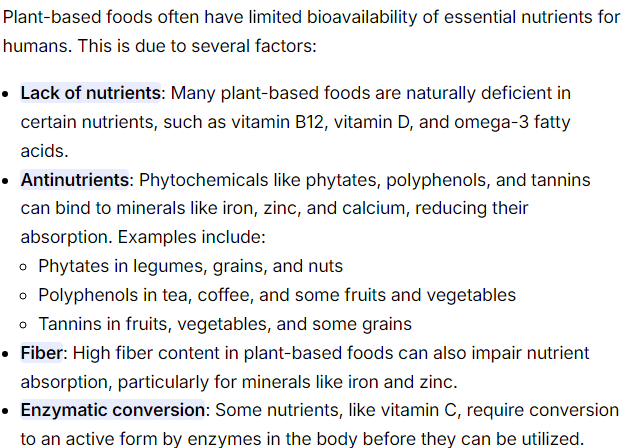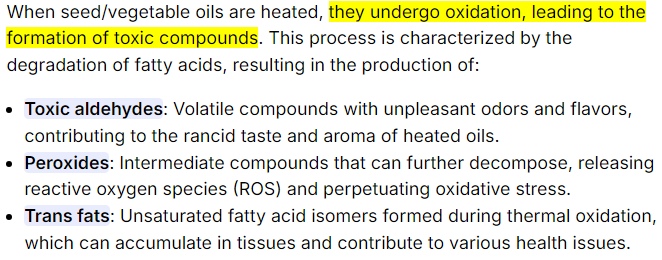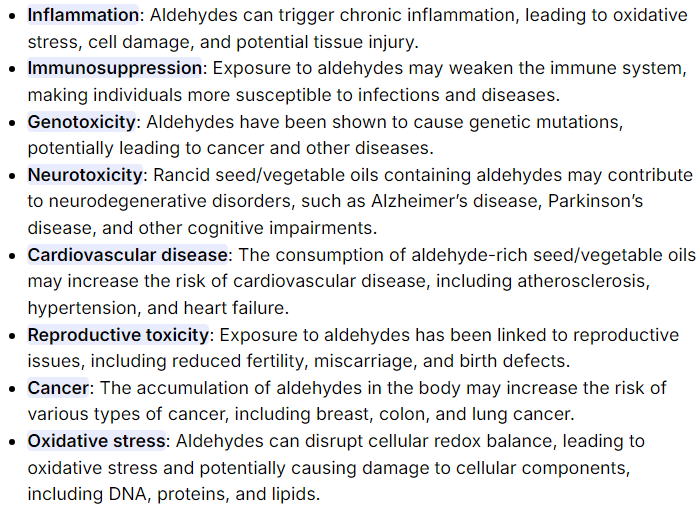Healthline, the owners of ‘Medical News Today,’ are back with a new article, this time about foods that are rich in essential and life-sustaining cholesterol.
While they have to admit that cholesterol is essential and good for you, let’s see if and how they twist this article to fit the malnutrition, disease and anti-healing agenda of the food- and pharmaceutical industry.
“Certain high cholesterol foods, including eggs and full-fat yogurt, can benefit your overall health. But others, such as processed meats, may raise your risk for heart disease and other serious health conditions.”
Searching all available literature and research papers within biochemistry and biology, we can establish that cholesterol is a relatively stable molecule, and its structure remains intact even when exposed to relatively high temperatures, much higher than used in the industrial processing of food.

So, this means that the culprit with processed and ultra processed foods is not the cholesterol, as it likely remains intact and is vital and essential for sustaining life.

With that said, ultra processed food that has been on the shelf for a long time might have degraded molecules of cholesterol that might have a negative effect when consumed. However, everything else found in processed and ultra processed foods are thousands times worse for your health, such as carbohydrates, seed/vegetable oils (that actually immediately go rancid and become extremely toxic,) flavorings, stabilizers, thickeners, preservatives, and other unnatural chemicals.

This means that focusing on ‘cholesterol’ in these man-made processed “foods” is extremely misguided and simply propaganda; programming the masses that while cholesterol is essential and very good for you, it can also be “dangerous,” which it is not.
“Cholesterol in food is often misunderstood. Eating healthy high cholesterol foods is actually not harmful to most people. Some of these foods are even loaded with important nutrients.”
Cholesterol from animals is not harmful to anyone, as it is essential and needed by every single cell in our body. Anything you can find in a living being, such as in an animal or what is about to become an animal, such as in an egg, only contains nutrients that are vital to life, nutrients that sustain life. These nutrients are stored in cells in the perfect format and amount as needed by those cells, exactly the same way as we store nutrients in our bodies. None of these can ever be harmful. They are 100% natural and bioavailable for us as humans. Only plant-based edibles or man-made chemicals and such can be extremely harmful and damaging.


1–7: Healthy foods that are high in cholesterol
1. Eggs
“Eggs are one of the most nutritious foods you can eat, especially as a source of protein. They also happen to be high in cholesterol, with 1 large egg (50 grams [g]) delivering 207 milligrams (mg)of cholesterol.
Research suggests that eggs don’t raise cholesterol levels and that eating whole eggs may boost heart-protective high-density lipoprotein (HDL) cholesterol, also known as “good” cholesterol.”
Anything from the animal-kingdom that is natural and unprocessed is good for you. And cholesterol levels are managed by your body depending on its needs. As every cell is composed of cholesterol, your cholesterol levels will increase whenever your body needs to repair or heal tissues. However, this can only happen if you have enough building blocks to produce your own cholesterol and/or you get enough from the food you consume.



This is why we can see cholesterol plummet in vegans, as they do not get any from their food and they lack animal fats and other compounds to produce their own. That is why they decay as rapidly as they do, because they can not heal. Their bodies continuously break down. That is extremely dangerous, and I’ve covered this in depth in my articles, “Totally Wrong Again About Inflammation and Cholesterol (the Healing Process),” and “Cholesterol, LDL and HDL 101: They Got It All Backwards.”
“There is also some research to suggest that levels of low-density lipoprotein (LDL) cholesterol (also known as “bad” cholesterol) may increase as egg consumption increases. However, eating 1–2 eggs per day is perfectly safe for generally healthy people.”
And there it comes, the backwards programming, the propaganda. There is no such thing as “good” or “bad” cholesterol. LDL is a carrier of cholesterol to the tissues that need it, while HDL carries unused or damaged cholesterol from the repair process back to the liver to be discharged. This means that if you suddenly start to consume more cholesterol and your LDL goes up, it is because there is tissue damage that needs to be repaired and you finally have the building blocks to do so. This is kindergarten-level logic, still the inverted and evil school of medicine twists this to sell their drugs and to keep you sick and diseased. And of course, the writers at Healthline are either too stupid or indoctrinated to recognize this basic mechanism that is acknowledged in biology and human physiology.


2. Cheese
“A single slice (22 g) of Swiss cheese provides around 20 mg of cholesterol and is a good source of calcium and other nutrients.
One 12-week study in 139 people found that eating 3 ounces (oz), or 80 g, of full-fat cheese per day, which is considered a high intake, didn’t raise LDL cholesterol when compared with the same amount of low fat cheese or an equal number of calories from bread and jam.”
That was one wasted and retarded study. Again, LDL will only go up if your body needs to heal tissue and has the cholesterol to do so. Unfortunately for the group consuming bread and jam, their tissues will need healing after that onslaught of blood glucose.
3. Shellfish
“Shellfish — including clams, crab, and shrimp — are excellent sources of protein, B vitamins, iron, and selenium.
A 3-oz (85-g) serving of canned shrimp provides 214 mg of cholesterol. However, research indicates that people who eat more seafood may experience improved cognitive, visual, and cardiovascular health.”
While shellfish do contain some iodine and other essential nutrients, including cholesterol, most of them are bottom feeders. That means that shellfish that live in close proximity to the seafloor, such as clams and mussels, are more susceptible to toxin accumulation. This is actually true for some fish as well, which is why we who follow our natural human and carnivorous diet focus on ruminant animals, which are extremely good at detoxifying. Also, we usually eat these animals between the age of 1 to 2 years, which reduces the possibility of toxic build-up even farther. Within biology it is established that mammals are the only source of nutrition for humans that is totally free of toxins.


4. Pasture-raised steak
“Pasture-raised steak is packed with protein and important vitamins and minerals.
It’s lower in cholesterol than feedlot beef and contains significantly more omega-3 fatty acids, which have anti-inflammatory properties.
A 4-oz (113-g) serving of pasture-raised steak has about 62 mg of cholesterol.”
Any fatty cut of beef together with egg yolks are your best sources of cholesterol and nutrition as a whole.
5. Organ meats
“Cholesterol-rich organ meats — such as heart, kidney, and liver — are highly nutritious.
For example, chicken heart is an excellent source of the powerful antioxidant CoQ10, as well as vitamin B12, iron, and zinc. A 1-cup (145-g) serving provides 351 mg of cholesterol.
A 2017 study of more than 9,000 Korean adults found that those with a moderate intake of unprocessed meat, including organ meats, had a lower risk of heart disease than those with the lowest consumption.”
Yes. However, an animal only comes with one liver, one heart, two kidneys, and so on. This means that organ meats are more like nature’s super-supplements. A way to get extra micronutrients if needed. Also, since each organ contains the nutrients it needs to function properly, you can “supplement” with that organ if your own organ needs to heal.
6. Sardines
“In addition to being loaded with nutrients, sardines are a convenient protein source.
One 3.75-oz (92-g) serving of these tiny fish contains 131 mg of cholesterol. It also provides 63% of the Daily Value (DV) for vitamin D, 137% of the DV for vitamin B12, and 35% of the DV for calcium.”
While sardines are susceptible to bioaccumulation of pollutants, their short lifespan and rapid growth rate may contribute to a relatively lower accumulation of toxins compared to larger fish. Still, even larger fish if caught naturally are very low in toxins.
So in that sense, sardines can be a good addition every now and then, but I would classify them as a good source of omega-3.
7. Full-fat yogurt
“Full-fat yogurt is a cholesterol-rich food packed with nutrients. One cup (245 g) of full-fat yogurt contains 31.8 mg of cholesterol.
Research associates increased intake of full-fat fermented dairy products with reduced LDL cholesterol and blood pressure and a lower risk of stroke, heart disease, and diabetes.”
Especially if non- or low-heat pasteurized and without any additional processing or “enrichment.” Unfortunately, a lot of food companies add synthetic vitamins and the extremely toxic Vitamin D3 to their dairy products, making them very toxic and damaging. Some even add stabilizers, thickeners, and sweeteners or flavorings, which also are toxic and damaging. The only ingredient should be whole milk and a starter culture.
8–11: High cholesterol foods you should avoid
Again, do not call them “high cholesterol foods,” call them for what they are, as in “processed foods.” To be correct, that headline should read “processed foods that do contain cholesterol but you should avoid.”
8. Fried foods
“Fried foods, such as deep-fried meats and cheese sticks, are high in cholesterol and worth avoiding whenever possible.
That’s because they’re high in calories and may contain trans fats, which can increase heart disease risk and be detrimental to your health in many other ways. High intake of fried foods has also been linked to an increased risk of heart disease.”
Deep-fried meats and cheese sticks are fried in seed/vegetable oils, oils that are extremely unstable and go rancid the moment they are produced and bottled. Heating them will accelerate the oxidation process, producing aldehydes and trans fats (especially in industrial hydrogenated oils.) Also, as part of the deep-frying process, they marinate the meat in toxic oils, spices, and herbs and then coat it with bread to add texture (as in toxic grains.)


So, again, the cholesterol has nothing to do with the health problems these foods present, that all comes from the seed/vegetable oils, the breading, and other chemicals they might add to the mix.
9. Fast food
“Fast food intake is a major risk factor for numerous chronic conditions, including heart disease, diabetes, and obesity.
People who frequently eat fast food tend to have higher cholesterol, more belly fat, higher levels of inflammation, higher blood pressure, and impaired blood sugar regulation.”
They have higher cholesterol because the food damages their blood vessels, their organs, their soft tissues, and their nerves, while they actually get some cholesterol from the food, so that their bodies desperately can try and keep up with healing. Unfortunately, that is a losing battle for most people as they do not get enough nutrients from real food and the onslaught of damage from poor food choices will outweigh their ability to detox and heal.
And belly fat, as in all fat storage, mainly comes from toxic accumulation and over-consumption, especially carbohydrates and seed/vegetable oils. I covered this in my article “What Makes You Fat?”
10. Processed meats
“Processed meats, such as sausages, bacon, and hot dogs, are high cholesterol foods that you should limit in your diet.
A large review involving more than 614,000 participants associated each additional 2-oz (50-g) serving of processed meat per day with a 42% higher chance of heart disease.”
Bacon, or any other cut of meat, should always be bought unprocessed from a butcher or the meat counter. Anything that is processed is no longer animal-based, it’s no longer carnivore as they have added preservatives, flavor enhancers, colorants, moisture absorbers, binders, thickeners, anticoagulants, and even colorings.
Sausages and hot dogs even have a lot of sugars added to them. So, yes, all processed meat, just as all processed “food” should be avoided. None of them are longer food. It’s man-made toxic slave junk.
And again, the increased risk of “modern diseases” is not from the little meat that is left in these products, it’s from all the additives and processing. That should be a no-brainer.
11. Desserts
“Cookies, cakes, ice cream, pastries, and other sweets tend to be high in cholesterol, added sugars, unhealthy fats, and calories.
Research has linked high added sugar intake to obesity, diabetes, heart disease, mental decline, and certain cancers. Plus, these foods often lack nutrients your body needs to thrive, such as vitamins, minerals, protein, and healthy fats.”
The cholesterol in these foods usually come from the little milk and butter that is used. Still, that is not the problem, every other ingredient and the processing is the problem.
At least you admitted that sugar is linked to every single “modern disease,” and sugar is simply carbohydrates — as all types of carbohydrates break down to glucose.
What is cholesterol, and is it unhealthy?
“Cholesterol is a waxy substance found in our bodies and in animal products such as meat, eggs, and dairy. It’s important for hormone production, vitamin D absorption, and production of bile to digest fats.”
Again, and certainly by choice, you do not tell your readers that cholesterol is present in every single cell and that it therefore is crucial for cellular repair. This is the most important thing to understand about cholesterol.
“Your liver produces cholesterol, but you can also get it from eating animal-based foods. HDL (“good”) cholesterol helps your body excrete excess cholesterol, while LDL (“bad”) cholesterol is associated with plaque buildup in arteries.
You can only produce cholesterol in the liver if you have enough animal fat in your diet, as in saturated fats. If not, you will not be able to synthesize Acetyl-CoA. Also, androgens play a vital role in regulating cholesterol synthesis, and androgens are made from saturated fats, several enzymes and cholesterol. In other words, if you do not get enough cholesterol, things will go downhill fast. Again, we see this in all vegans, fruitarians, and even vegetarians.
And LDL is, once again, used to transport cholesterol to tissue that is damaged and needs repair. Plaque build-up is from damaged tissue due to high blood glucose (consuming carbohydrates) and the presence of unsaturated fats from seed/vegetable oils.


Is dietary cholesterol harmful?
“Research suggests that dietary cholesterol doesn’t significantly affect cholesterol levels in your body. And research does not support an association between dietary cholesterol and heart disease in the general population.”
Because most people get enough cholesterol, but are still malnourished while overfed because their diets are focused on macronutrients instead of micronutrients. This means that their bodies still struggle to heal and repair damaged tissue, even if it has enough cholesterol.
And this is why we often see cholesterol levels go up in people who either adopt a more nutritious ketogenic diet, or an animal-based diet. The toxic load goes down and they get more nutrients. The result is that their bodies can finally start to heal, which means more cholesterol in circulation. Super simple, super logical.
And after this the shills at Healthline present some “healthy ways” to lower cholesterol, something that you should never do! And this is why they actually were kind of truthful about the benefits of cholesterol and actually made a good list of healthy high-cholesterol foods.
They tell you a little bit of truth, while still lying to you about the main function of cholesterol and why you may experience high levels of cholesterol.
Yes, it’s all about healing the body, the damage from the modern diet — and that is why they claim that high cholesterol is bad and that LDL is bad, when the truth is the complete opposite!
Remember, they want you to be weak, dumbed down, ridden with modern diseases, dependent on their drugs and “care,” while keeping your lifespan as short as possible so you die shortly after retirement, like a good little tax-slave.
And as always, if you want to be your absolute best, to heal and live for as long as possible without any disease, all you need to do is to adopt our natural human species-specific and species-appropriate carnivorous diet. And as a bonus, you will never have to worry about any nutrients, and deficiencies, or things like ‘cholesterol.’ It’s our natural way of eating, and as long as you focus on fatty cuts of meat, everything will take care of itself and you will thrive.
If you need more information, please look through my quick-start archive with hundreds of articles listed by subject. And if that is still not enough, or you need guidance, you know where to find me.
And if you found the article and my insights helpful and enjoy my free information, please consider donating to help pay the webhosting bills and keep the site running. And if you’re interested in discussing and sharing information with likeminded people, consider joining our uncensored community at Ungovernable.se. Thank you!

